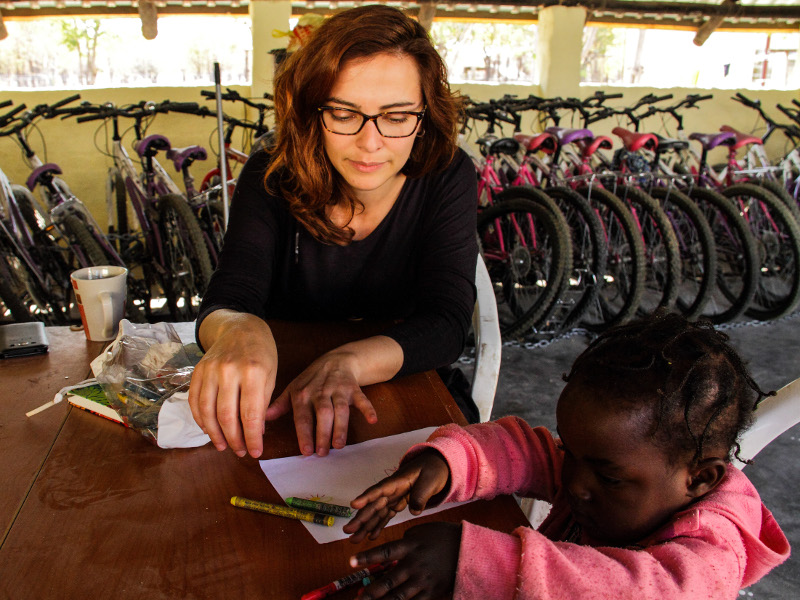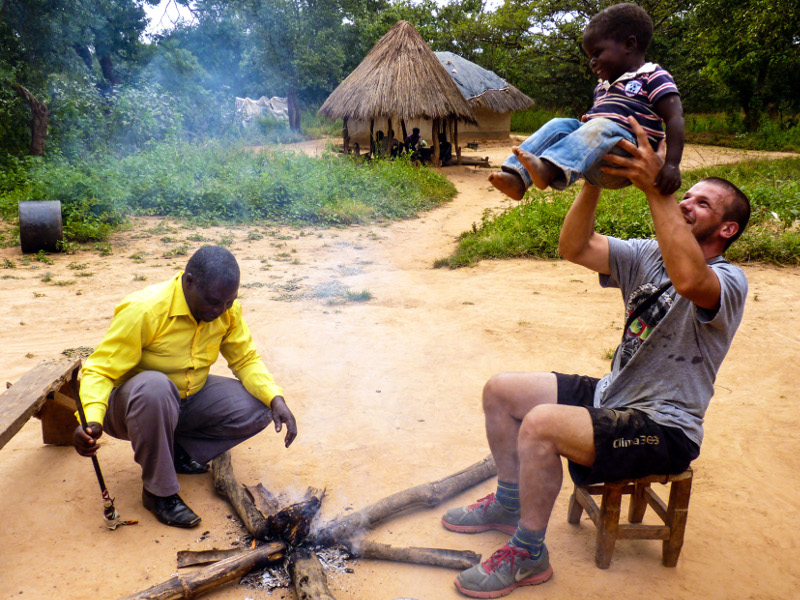Here we will introduce you to the programmes and people at CICD and we will do our best to give you a glimpse of what the daily life is like here. CICD is a place full of activists. We have taken an active stand to some of the most burning issues of our time and have decided to stand shoulder to shoulder with people working to change their conditions for the better.
Since 1998 we have trained more than 1200 volunteers - Development Instructors and Climate Activists - at CICD - people of all ages, 80 different nationalities, different faiths, different backgrounds in every way. Each one of these volunteers have gone to carry out front line development work at projects run by Humana People to People in Southern Africa and India. Take a moment to think of this - and take into consideration that we have 4 sister schools that run the same kind of programmes.
Join our movement for building a better future
Together with the thousands of people at the development projects, we have formed a truly unique International Brigade acting upon what is the biggest contradiction in the world of today - the difference between the rich and the poor.
Our movement is built on togetherness, trust, progress and respect for the individual human being. In a world where violent conflicts create divisions among people and mistrust and disregard for human life, we will fight hard to maintain our ethos and culture in all that we do.
The Poor is the person whose situation is so desperate, that he needs a helping hand to at all get his head so high up that he can see a future for himself and his family past the next meal. Poverty is not merely a phenomenon to be studied and theorised upon - we see a big crowd of The Poor - people like you and me, who have not had a chance to start with, and who are victims of centuries of exploitation by countries from our part of the world - an exploitation that continues to this day.
More than half of the world's people live on less than $2.5 a day. It is a disgrace, and we need to do something about it. Like the man who moved the mountain, we must continue to get together in our thousands to stand shoulder to shoulder with The Poor.
We strongly believe that the only way we are going to see some real change in the world is when a lot of people get together and say "enough is enough" and create the future we want for ourselves and for the next generation.
Taking action to make a change!
We cannot wait for governments and officials to do it. The situation for the many is getting worse, not better. The average consumption of a family in Africa has dropped 20% over the last 25 years. Why, with all the resources, know-how and technology available to us in this day and age, is this allowed to happen? At the same time rich nations close their borders, claim debt payments from desperately poor countries, and impose conditions on loans and donations that do not serve the interest of The Poor but of the donor countries themselves. This is the consequence of an economic system that is directed by competition for personal gain.
For the individual this can all be quite daunting, and when adding that we are now facing the bill for not looking after the environment - well, we have to act. There can no longer be any doubt - climate change is happening. Some scientists say that it is too late to reverse it - all we can do is prepare for the worst. We find our politicians and leaders unable to unite and point a clear direction. We all know that the fossil fuels that we have been burning so massively are running out. We know that the world's population is increasing, and that the biggest increase is in the poorest part of the world. It is logical that the lifestyle and level of consumption that we have grown up with can not continue. We witness a growing number of serious natural disasters - tsunamis, wildfires, floods, earthquakes. So it makes sense to have a plan and a strategy, but we cannot rely on the world's leaders to make it. We have to get together and start creating a different future.
To investigate a problem is to solve it...
A wise philosopher once said: "To investigate a problem is to solve it". The same goes for the challenges facing us in the decades to come. It is only when we face up to them, investigate, understand and learn how to deal with them that we can take the right action. We do this at CICD. All our programmes are solidly founded in today's reality and looking towards the future. It is essential that we live and work collectively. The tasks we face are too big to solve alone.
There is no recipe for development
We work with development on all levels, changing things for the better. At the projects in Africa and India, at CICD, in the wider community, in the teams and groups and indeed with each of us personally. It is not an easy ride. Working with development is exciting and challenging, because there is no recipe. How do you help a community in Malawi to create a better situation for themselves? You can't find the correct answer in an encyclopaedia. Maybe there isn't even a "correct" answer. You have to use your imagination and creativity, learn from your failures, be courageous and never give up. Studies can help you make the right analysis, but the best way of learning is studies combined with practice together with others. It is this kind of practice you get at CICD. Learning here is action based, and you will constantly be involved in projects, actions, planning and conclusions.
We all share the responsibility for running CICD with all that it entails. There are all the practical things, of course - cooking and kitchen management, cleaning and maintenance, growing vegetables and looking after our beautiful park, looking after the vehicles and equipment, managing the team economy etc. etc. Living collectively we also share the responsibility for each others' health and development. For many this is the first time in their lives that they live in this way together with people they have not chosen themselves. There are conflicts to be solved, issues to be discussed, differences between people to be used in the best possible way. We all have to work on our social skills and interaction with others.
Our teaching methods are untraditional and demanding, both for students and teachers. We all have to be active and involved to get the most out of it – this is where it starts, to create the change we want!
Alone the world changes you. Together we change the world.







